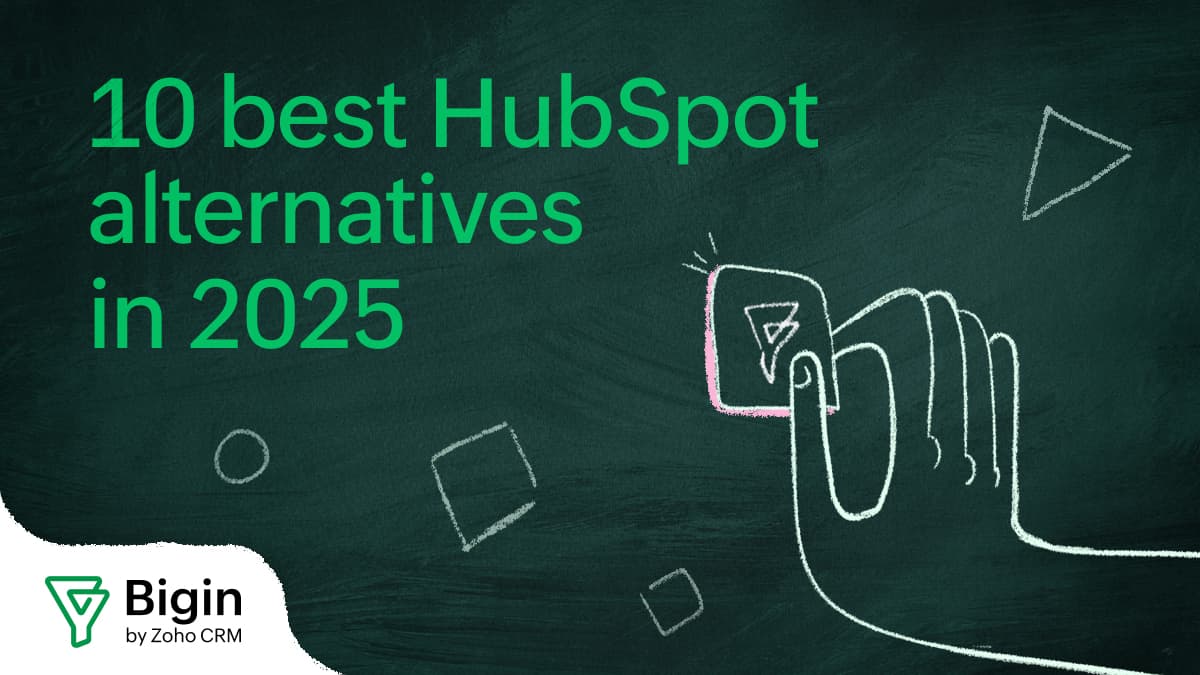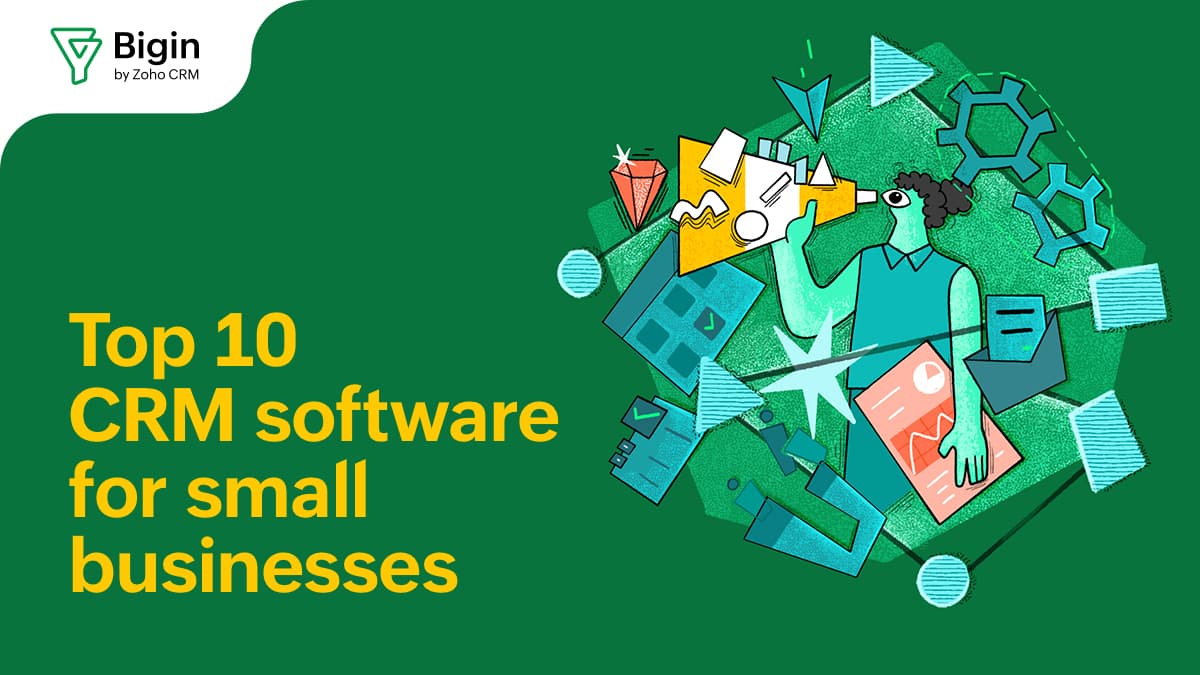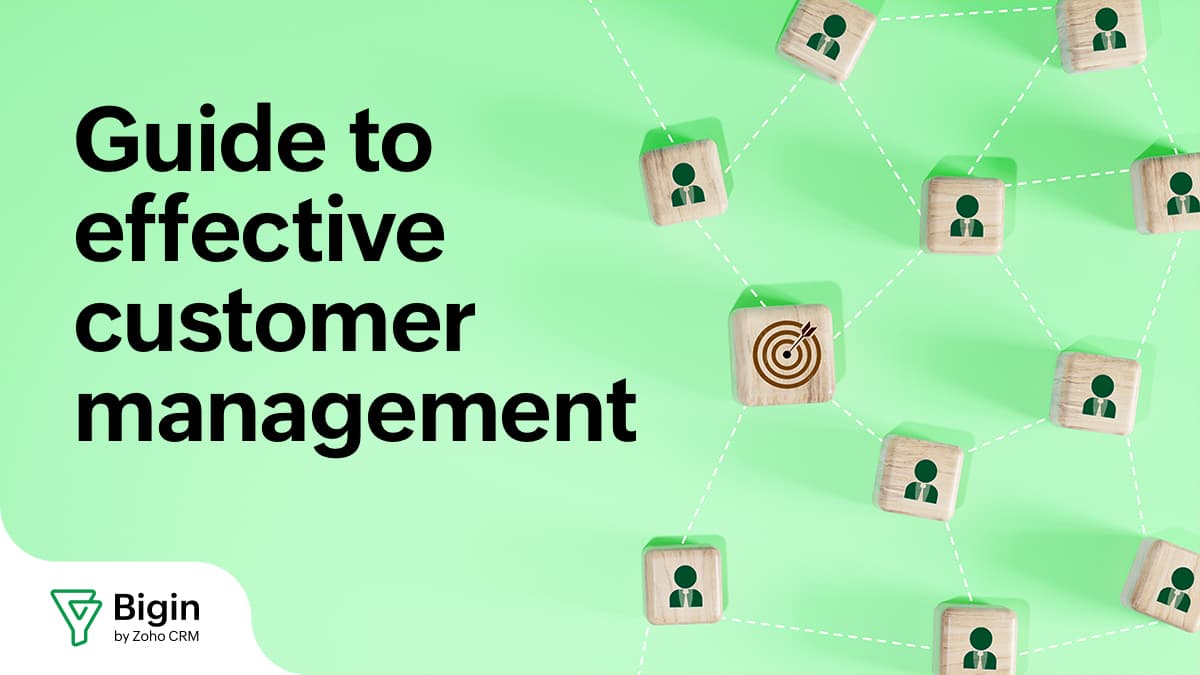10 best HubSpot alternatives in 2025
- Published : August 20, 2025
- Last Updated : August 26, 2025
- 440 Views
- 10 Min Read

When it comes to customer relationship management, HubSpot has been a popular choice for years. It offers a wide range of tools for sales, marketing, and service teams. But while it is powerful, it's not always the right fit for small businesses. Some companies find it too expensive, while others feel it includes features they don't need. This is why many small business owners search for HubSpot alternatives or even compare HubSpot competitors to find a solution that fits their specific needs.
In 2025, there are more CRM choices than ever before. From lightweight tools made for small businesses to robust platforms that scale with larger teams, the market is full of options. If you're a business owner, the key is choosing a CRM that balances price, functionality, and ease of use. In this article, we'll explore the 10 best alternatives to HubSpot this year and highlight why one tool in particular—Bigin by Zoho CRM—is becoming a favorite for growing businesses.
Why look for a HubSpot alternative?
Before diving into the list, it helps to understand why businesses start looking for a HubSpot alternative in the first place. Here are some of the most common reasons:
Cost: HubSpot's free plan is attractive, but its advanced features can become expensive as your business grows. Many small businesses need an affordable CRM that delivers value without high recurring costs.
Feature overload: HubSpot offers a wide range of marketing and sales tools. However, many small businesses don't need everything it provides. Instead, they look for simple and streamlined alternatives to HubSpot.
Ease of use: Some business owners feel HubSpot has a learning curve. A tool should help your team save time, not add complexity.
Scalability: Businesses want a CRM that can grow with them but not lock them into expensive upgrades.
Support needs: For small teams, reliable customer support is critical. Having access to responsive help can make a big difference in daily operations.
What to consider before choosing a CRM
When evaluating HubSpot competitors, it's important to think about what matters most for your business. Choosing wisely can save time, reduce costs, and make your sales process more effective. Below are the key considerations small businesses should keep in mind.
Pricing and value
Cost is a major factor for small businesses. CRMs range from free to expensive premium plans, but the key is value. Look beyond monthly fees and consider add-ons, user limits, and included features. A slightly higher-priced CRM that saves time and helps close deals can be more cost-effective in the long term than a cheaper, more limited option.
Simplicity
A CRM should simplify work, not complicate it. Small teams benefit from quick setup, clean navigation, and intuitive customization without IT help. The easier it is to adjust pipelines, fields, or automations, the faster your team adopts the tool. A simple but flexible CRM keeps workflows efficient while avoiding being overwhelmed by overly complex systems.
Features you actually need
More features are not always better. Many small businesses only need essentials like contact management, pipeline tracking, email integration, and basic automation. Start by identifying your daily challenges—such as tracking leads or managing follow-ups—and choose a CRM that solves those directly. Avoid paying for unused extras and focus on tools that boost productivity and sales.
Integrations
A CRM should fit seamlessly with the tools you already use, like Gmail, Outlook, Slack, or QuickBooks. Good integrations save time, reduce duplicate work, and improve efficiency. Consider future needs, too; as your business grows, you may need marketing, support, or finance integrations. A CRM with flexible integration options ensures scalability and prevents you from outgrowing the system.
Customer support
Strong customer support is critical, especially for small businesses without IT staff. Look for providers offering live chat, phone, and email functionality, as well as a knowledge base. Quick, helpful responses reduce downtime, while onboarding resources, tutorials, and webinars speed up adoption. A reliable support team not only fixes issues but also helps you get the most from your CRM.
10 best HubSpot alternatives in 2025
Below are the top CRM choices that small businesses consider when looking for an alternative to HubSpot. Each entry includes clear, practical details to help you decide which tool might suit your needs, especially regarding cost, ease of use, and essential features.
1. Bigin by Zoho CRM
Bigin by Zoho CRM stands out as the best overall affordable CRM solution for small businesses in 2025. Designed specifically for compact teams, it offers a clean, pipeline-centric layout that feels like a step up from spreadsheets but remains simple to learn. You can set up Bigin and start using it in under 30 minutes, without any training required. It delivers core CRM features, such as contact and deal management, built-in telephony, email integration, workflow automation, customizable dashboards, and real-time notifications, all without overwhelming your team.
Beyond usability, Bigin gives you great value for money. Its pricing is transparent and starts as low as $7 per user per month (billed annually) for the Express plan, making it the most affordable CRM software for small businesses around. Despite the low cost, it doesn't cut corners; users frequently praise its intuitive interface, mobile app, and pipeline visibility. One reviewer described it as "simple, intuitive, and does exactly what I need without overwhelming me with features I don't use." Another highlighted how Bigin replaced the chaos of spreadsheets, centralized contacts, and streamlined follow-ups, resulting in faster response times and better team alignment.
Looking ahead, Bigin offers a smooth growth path. Because it's part of the Zoho ecosystem, you can upgrade to the more feature-rich Zoho CRM when your business outgrows Bigin—without losing your data or changing systems entirely. Plus, recent updates like Team Pipelines enable different teams to manage operations independently within the same account. This combination of simplicity, affordability, and scalability makes Bigin the hero among HubSpot alternatives for small businesses in 2025. For a detailed comparison between Bigin and HubSpot, check out our in-depth guide.
2. Zoho CRM
Zoho CRM has been around for years and remains one of the most trusted names in the CRM space. Unlike Bigin, which is tailored for small businesses, Zoho CRM is designed to support a wide range of businesses, from startups to large enterprises. It offers an extensive feature set that includes lead management, sales forecasting, workflow automation, email marketing, social media integration, and advanced analytics. For companies that want a more complete suite of tools, Zoho CRM provides everything needed to manage the entire customer journey from lead capture to after-sales service.
Another strength of Zoho CRM is its ability to integrate seamlessly with other Zoho applications, such as Zoho Books, Zoho Campaigns, and Zoho Desk. This makes it an attractive choice for companies that want an all-in-one ecosystem. Pricing is also competitive, with flexible plans that enable businesses to start small and upgrade as needed. For businesses seeking flexibility without high costs, Zoho CRM continues to be one of the best HubSpot competitors in 2025, offering the depth of features that growing teams often require.
3. Pipedrive
Pipedrive is built around a visual pipeline model that helps you manage deals at a glance. The drag-and-drop interface makes it easy to track progress through stages, which is ideal for sales teams that want clarity and momentum. It also offers workflow automation, smart contact data, messaging history, activity reminders, and mobile access.
Pipedrive shines in giving you clean, focused control over your sales process. You can centralize multichannel data, automate repetitive tasks, sync with your favorite tools, and get useful insights via dashboards and activity tracking. It integrates with hundreds of apps, such as Slack, Zoom, Outlook, Gmail, HubSpot, and Monday.com, so your workflows stay connected. Pipedrive is especially useful if you want a CRM designed by and for salespeople, but note that it lacks a forever-free tier, which may matter if affordability is a top concern.
4. Freshsales
Freshsales (by Freshworks) is an all-in-one CRM built with AI-powered insights. It helps small businesses by offering lead scoring, activity capture, and built-in communication tools, such as email and phone, all within a unified interface. Freshsales is ideal when you want your CRM to do some of the thinking for you, from prioritizing leads to simplifying outreach.
Users appreciate how Freshsales keeps everything together: your prospects, interactions, and sales actions are all on the same dashboard, saving time and reducing friction. It brings balance, more automation and intelligence than basic CRMs, but still friendly and accessible for small teams who don't want a steep learning curve.
5. Insightly
Insightly doubles as both a CRM and project management tool, making it a smart pick for customer-focused businesses that also juggle internal tasks and project work. You can manage leads and pipeline stages, then easily move to post-sale projects or service tasks without hopping between platforms.
Recent reviews highlight how Insightly helps teams set up workflows like lead routing, email campaigns, and task assignment quickly and measure results with built-in reports. While it may have a bit more complexity than lightweight CRMs, the ability to manage both relationships and work in one place makes it valuable for service-oriented small businesses.
6. Copper CRM
Copper works best for teams who use Google Workspace extensively. It plugs directly into Gmail, Calendar, Drive, and other Google apps. This means your CRM lives where your people already work, reducing friction and boosting adoption.
If your small business revolves around email and documents in Google, Copper lets you track interactions and deals without leaving your inbox. It simply fits into your workflow with no extra training needed.
7. Salesflare
Salesflare is all about smart automation for small B2B teams. It pulls contact details from emails, calendars, and social platforms, so you spend less time entering data and more time talking to customers. Its automation hints help guide follow-ups and remind you of next steps.
Salesflare's simple design and focus on automation make it a good pick when you want intelligence in your CRM but don't need complicated dashboards or processes.
8. Keap
Keap combines CRM with marketing automation, invoicing, and payment features. It's especially useful for businesses looking for an integrated tool that handles leads from the first email to the final sale.
You can automate campaigns, track payment status, and use CRM functions in one place. For businesses that want beyond-basic contact tracking, Keap offers a broader toolkit at manageable costs.
9. Close CRM
Close is built for businesses that rely heavily on calls, SMS, and frequent outreach. It brings email, phone, and messaging into one interface, so everything stays logged and accessible.
If your small business runs on high-touch communication, like inside sales or telesales, Close helps you keep records, track call history, and streamlines follow-up workflows.
10. Capsule CRM
Capsule is a lightweight, user-friendly CRM that keeps things simple. You manage contacts, tasks, and pipelines without much setup or complexity.
It's budget-friendly and is often listed among affordable CRM options for small businesses. It also integrates with tools like Gmail, Office 365, Mailchimp, Xero, QuickBooks, and more via Zapier. Capsule is a good fit if you want a clean, no-frills CRM that just works.
Why Bigin is the best HubSpot alternative for small businesses
When you look at the CRM landscape in 2025, Bigin stands out as one of the strongest alternatives to HubSpot. Here's why:
Affordable: Affordable CRM software for small business is something frequently sought, because small businesses often can't justify high monthly fees. Bigin is priced with this in mind, offering professional features at a fraction of the cost.
Designed for small teams: Unlike many platforms that try to cater to all business sizes, Bigin is built specifically for small businesses. This makes it easier to use without extra clutter.
Pipeline-centric: Bigin simplifies deal tracking with visual pipelines, helping teams stay organized and focused.
Integrations: It connects smoothly with email, telephony, and other essential apps that small businesses already use.
Scalable: As your company grows, you can expand to Zoho CRM without losing your data or processes.
For businesses comparing HubSpot competitors, Bigin strikes the right balance between functionality and affordability. It's powerful enough to manage sales pipelines but simple enough to get started quickly.
Affordable CRM options for small businesses
Small businesses don't just want features; they want value. A tool should empower your team without putting pressure on your budget.
Here are a few reasons why affordability matters:
It enables you to invest more in growth activities such as marketing and customer service.
It lowers the risk of adoption since you're not committing to large expenses.
It ensures that your team can focus on using the software effectively instead of worrying about costs.
Among all the CRMs in this list, Bigin delivers the strongest mix of affordability, usability, and small-business focus. It addresses the real challenges that small teams face every day.
Final thoughts
HubSpot is a strong CRM, but it's not always the best choice for small businesses. If you're searching for a HubSpot alternative that fits your budget, is easy to use, and helps you stay organized, the good news is that there are many options in 2025.
From tools like Pipedrive and Freshsales to lightweight systems like Capsule, businesses can choose based on their priorities. However, if your focus is on simplicity, affordability, and features tailored for small teams, Bigin by Zoho CRM deserves to be at the top of your list.
For any small business that wants a CRM built with them in mind, Bigin is one of the best solutions available in 2025.
FAQs
What is the best affordable CRM?
The best affordable CRM in 2025 for small businesses is Bigin by Zoho CRM. It's built specifically for small teams that want simplicity without sacrificing essential features. With a clean pipeline view, built-in automation, email integration, and mobile access, it helps businesses stay organized and close deals faster. Priced transparently at just $7 per user per month, Bigin delivers excellent value, making it the most cost-effective choice for small businesses that need a powerful yet budget-friendly CRM.
Is there a totally free CRM?
Yes, Bigin by Zoho CRM has a free-forever plan.
Who are HubSpot's competitors?
Some of the top HubSpot competitors in 2025 include Bigin by Zoho CRM, Zoho CRM, Pipedrive, Freshsales, Insightly, Copper CRM, Salesflare, Keap, Close CRM, and Capsule CRM. These platforms provide a wide range of features designed to help small businesses manage contacts, track pipelines, and automate daily tasks at different price points. While HubSpot remains a strong player in the market, these alternatives give small businesses flexibility to choose a CRM that best balances cost, functionality, and ease of use.
 Anubhav
AnubhavAnubhav is a product marketer with an insatiable thirst for all things content marketing, technology, and SaaS. His expertise lies in crafting compelling narratives that resonate with audiences and drive business growth. With a deep-rooted interest in entrepreneurship, Anubhav closely follows the latest industry trends and innovations, constantly seeking new ways to elevate marketing strategies.


